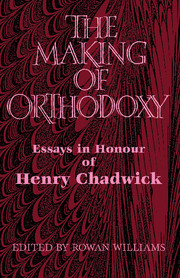Book contents
- Frontmatter
- Contents
- Preface
- List of abbreviations
- Bibliography of Henry Chadwick
- Does it make sense to speak of pre-Nicene orthodoxy?
- ‘And I have other sheep’ – John 10:16
- Reason and the rule of faith in the second century ad
- Adam in Origen
- Panegyric, history and hagiography in Eusebius' Life of Constantine
- Matthew 28:19, Eusebius, and the lex orandi
- The achievement of orthodoxy in the fourth century ad
- Eunomius: hair-splitting dialectician or defender of the accessibility of salvation?
- Some sources used in the De Trinitate ascribed to Didymus the Blind
- The rhetorical schools and their influence on patristic exegesis
- Pelagianism in the East
- The legacy of Pelagius: orthodoxy, heresy and conciliation
- Augustine and millenarianism
- Divine simplicity as a problem for orthodoxy
- The origins of monasticism
- Artistic idiom and doctrinal development
- Index of modern names
- Index of ancient and medieval names
- Index of sources
Divine simplicity as a problem for orthodoxy
Published online by Cambridge University Press: 08 October 2009
- Frontmatter
- Contents
- Preface
- List of abbreviations
- Bibliography of Henry Chadwick
- Does it make sense to speak of pre-Nicene orthodoxy?
- ‘And I have other sheep’ – John 10:16
- Reason and the rule of faith in the second century ad
- Adam in Origen
- Panegyric, history and hagiography in Eusebius' Life of Constantine
- Matthew 28:19, Eusebius, and the lex orandi
- The achievement of orthodoxy in the fourth century ad
- Eunomius: hair-splitting dialectician or defender of the accessibility of salvation?
- Some sources used in the De Trinitate ascribed to Didymus the Blind
- The rhetorical schools and their influence on patristic exegesis
- Pelagianism in the East
- The legacy of Pelagius: orthodoxy, heresy and conciliation
- Augustine and millenarianism
- Divine simplicity as a problem for orthodoxy
- The origins of monasticism
- Artistic idiom and doctrinal development
- Index of modern names
- Index of ancient and medieval names
- Index of sources
Summary
‘The evolution of orthodoxy’ might easily be understood as a process which belongs wholly to the past: the development of Christian doctrine, on which Henry Chadwick has shed such a graceful and penetrating light, would then be contrasted with a complete and stable construction in which Christianity has come to rest. But to call it complete and stable need not mean that further progress is excluded; at the very least, new challenges are likely to arise, and old truths will need to be re-stated. And most of our generation, and of our juniors, will think this programme far too tame: in their eyes, only an obstinate and secluded mind will persist in defending an orthodoxy that is purely static. I for one would certainly wish to see its evolution as a continuing process, in which established positions need to be clarified and some false steps retracted, in the faith that a better grounded and better articulated consensus of belief may be attained.
From such a standpoint one can turn with a rueful admiration to a handbook which has given invaluable service to a succession of beginners in theology, the Enchiridion Patristicum of M. J. Rouet de Journel, completed in 1911 and appearing in its twenty-fourth edition in 1969.
- Type
- Chapter
- Information
- The Making of OrthodoxyEssays in Honour of Henry Chadwick, pp. 255 - 269Publisher: Cambridge University PressPrint publication year: 1989

